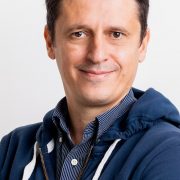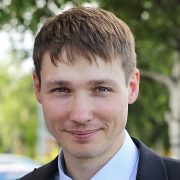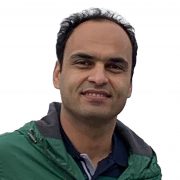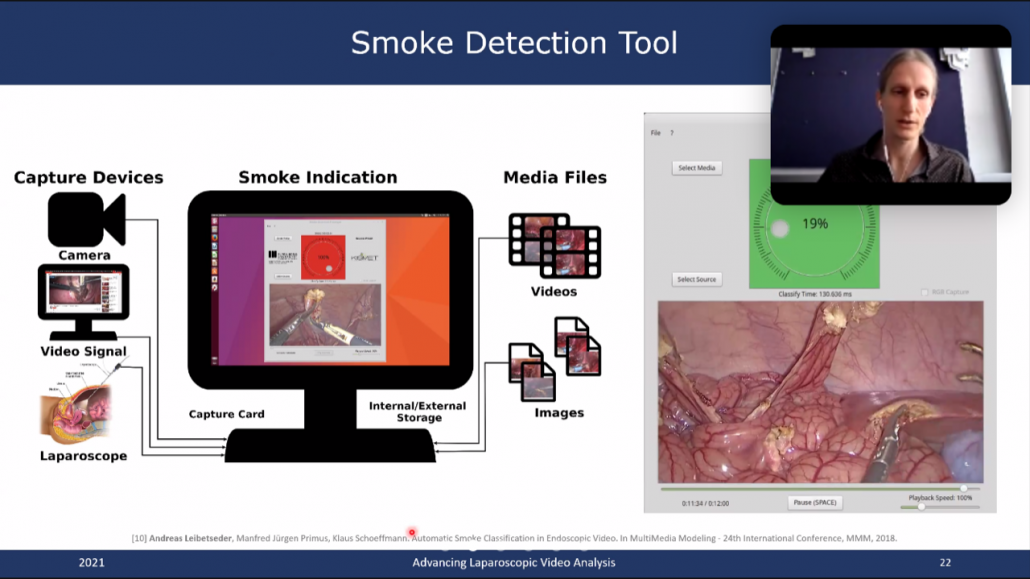 On August 30th 2021, Andreas Leibetseder successfully defended his thesis on “Extracting and Using Medical Expert Knowledge to Advance Video Analysis for Gynecologic Laparoscopy” under the supervision of Prof. Klaus Schöffmann. The defense was chaired by Prof. Hermann Hellwagner and the examiners were Prof. Oge Marques (Florida Atlantic University) and Prof. Mathias Lux (Klagenfurt University). Congratulations to Dr. Leibetseder for this great achievement!
On August 30th 2021, Andreas Leibetseder successfully defended his thesis on “Extracting and Using Medical Expert Knowledge to Advance Video Analysis for Gynecologic Laparoscopy” under the supervision of Prof. Klaus Schöffmann. The defense was chaired by Prof. Hermann Hellwagner and the examiners were Prof. Oge Marques (Florida Atlantic University) and Prof. Mathias Lux (Klagenfurt University). Congratulations to Dr. Leibetseder for this great achievement!
Title: On The Impact of Viewing Distance on Perceived Video Quality
Link: IEEE Visual Communications and Image Processing (VCIP 2021) 5-8 December 2021, Munich, Germany
Authors: Hadi Amirpour (Alpen-Adria-Universität Klagenfurt), Raimund Schatz (AIT Austrian Institute of Technology, Austria), Mohammad Ghanbari (School of Computer Science and Electronic Engineering, University of Essex, Colchester, UK), and Christian Timmerer (Alpen-Adria-Universität Klagenfurt)
Abstract: Due to the growing importance of optimizing quality and efficiency of video streaming delivery, accurate assessment of user perceived video quality becomes increasingly relevant. However, due to the wide range of viewing distances encountered in real-world viewing settings, actually perceived video quality can vary significantly in everyday viewing situations. In this paper, we investigate and quantify the influence of viewing distance on perceived video quality. A subjective experiment was conducted with full HD sequences at three different stationary viewing distances, with each video sequence being encoded at three different quality levels. Our study results confirm that the viewing distance has a significant influence on the quality assessment. In particular, they show that an increased viewing distance generally leads to an increased perceived video quality, especially at low media encoding quality levels. In this context, we also provide an estimation of potential bitrate savings that knowledge of actual viewing distance would enable in practice.
Since current objective video quality metrics do not systematically take into account viewing distance, we also analyze and quantify the influence of viewing distance on the correlation between objective and subjective metrics. Our results confirm the need for distance-aware objective metrics when accurate prediction of perceived video quality in real-world environments is required.
Title: Improving Per-title Encoding for HTTP Adaptive Streaming by Utilizing Video Super-resolution
Link: IEEE Visual Communications and Image Processing (VCIP 2021) 5-8 December 2021, Munich, Germany
Authors: Hadi Amirpour (Alpen-Adria-Universität Klagenfurt), Hannaneh Barahouei Pasandi (Virginia Commonwealth University), Mohammad Ghanbari (School of Computer Science and Electronic Engineering, University of Essex, Colchester, UK), and Christian Timmerer (Alpen-Adria-Universität Klagenfurt)
Abstract: In per-title encoding, to optimize a bitrate ladder over spatial resolution, each video segment is downscaled to a set of spatial resolutions and they are all encoded at a given set of bitrates. To find the highest quality resolution for each bitrate, the low-resolution encoded videos are upscaled to the original resolution, and a convex hull is formed based on the scaled qualities. Deep learning-based video super-resolution (VSR) approaches show a significant gain over traditional approaches and they are becoming more and more efficient over time. This paper improves the per-title encoding over the upscaling methods by using deep neural network-based VSR algorithms as they show a significant gain over traditional approaches. Utilizing a VSR algorithm by improving the quality of low-resolution encodings can improve the convex hull. As a result, it will lead to an improved bitrate ladder. To avoid bandwidth wastage at perceptually lossless bitrates a maximum threshold for the quality is set and encodings beyond it are eliminated from the bitrate ladder. Similarly, a minimum threshold is set to avoid low-quality video delivery. The encodings between the maximum and minimum thresholds are selected based on one Just Noticeable Difference. Our experimental results show that the proposed per-title encoding results in a 24% bitrate reduction and 53% storage reduction compared to the state-of-the-art method.
Title: INTENSE: In-depth Studies on Stall Events and Quality Switches and Their Impact on the Quality of Experience in HTTP Adaptive Streaming
Link: IEEE Access, A Multidisciplinary, Open-access Journal of the IEEE
[PDF]
Babak Taraghi (Christian Doppler Laboratory ATHENA, Alpen-Adria-Universität Klagenfurt), Minh Nguyen (Christian Doppler Laboratory ATHENA, Alpen-Adria-Universität Klagenfurt), Hadi Amirpour (Christian Doppler Laboratory ATHENA, Alpen-Adria-Universität Klagenfurt), Christian Timmerer (Christian Doppler Laboratory ATHENA, Alpen-Adria-Universität Klagenfurt)
Abstract: With the recent growth of multimedia traffic over the Internet and emerging multimedia streaming service providers, improving Quality of Experience (QoE) for HTTP Adaptive Streaming (HAS) becomes more important. Alongside other factors, such as the media quality, HAS relies on the performance of the media player’s Adaptive Bitrate (ABR) algorithm to optimize QoE in multimedia streaming sessions. QoE in HAS suffers from weak or unstable internet connections and suboptimal ABR decisions. As a result of imperfect adaptiveness to the characteristics and conditions of the internet connection, stall events and quality level switches could occur and with different durations that negatively affect the QoE. In this paper, we address various identified open issues related to the QoE for HAS, notably (i) the minimum noticeable duration for stall events in HAS;(ii) the correlation between the media quality and the impact of stall events on QoE; (iii) the end-user preference regarding multiple shorter stall events versus a single longer stall event; and (iv) the end-user preference of media quality switches over stall events. Therefore, we have studied these open issues from both objective and subjective evaluation perspectives and presented the correlation between the two types of evaluations. The findings documented in this paper can be used as a baseline for improving ABR algorithms and policies in HAS.
Keywords: Crowdsourcing; HTTP Adaptive Streaming; Quality of Experience; Quality Switches; Stall Events; Subjective Evaluation; Objective Evaluation.
In July 2021, the ATHENA Christian Doppler Laboratory hosted three interns working on the following topics:
- Kassian Fuger: Machine Learning and Video Encoding for HTTP Adaptive Streaming
- Timo Pfeifer: HTTP Adaptive Streaming for Mobile Devices
- Vanessa Fröhlich: Machine Learning and its Applications
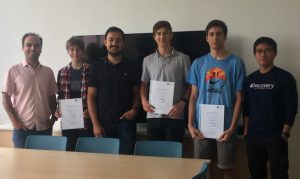
At the end of the internship, the interns presented their work and the results in the form of a presentation, and they have obtained a certificate of internship. We believe that the joint work was useful both for the laboratory and for the interns themselves. We would like to thank the interns for their genuine interest, productive work, and excellent feedback about our laboratory.
Kassian Fuger: “Those four weeks of the internship meant a lot for my future career path. The internship gave me a great view of what working with a smart and friendly team is like. Working on my tasks by myself taught me a lot and I learned and improved in every aspect of the internship and if something was unclear my supervisor was always there to help. I was well accepted into the team and we sometimes went for lunch together which was very nice and helped me to be confident around the team. Anyways spending a part of my summertime at ATHENA was super fun and good time investment. Being on the ATHENA team was a great experience and I think everyone can learn something there.”
Vanessa Fröhlich: “I really enjoyed the internship at ATHENA and would even be happy to do it a second time. It was a great experience working with the people there and getting to know certain things that I would have definitely not learned elsewhere. It was very interesting to work with a new type of programming! I also appreciated very much how I felt part of the team in the first days already and also enjoyed working independently but with the help of my supervisor Farzad whenever I needed something or was stuck with an exercise. I am very glad that I found this internship and can say that I have gained a lot of experience there. Thank you!”
We wish the interns every success in their journey through life and we hope to see them soon back at the University of Klagenfurt and ATHENA.
Special issue on Open Media Compression: Overview, Design Criteria, and Outlook on Emerging Standards
Proceedings of the IEEE, vol. 109, no. 9, Sept. 2021
By CHRISTIAN TIMMERER, Senior Member IEEE
Guest Editor
MATHIAS WIEN, Member IEEE
Guest Editor
LU YU, Senior Member IEEE
Guest Editor
AMY REIBMAN, Fellow IEEE Guest Editor

Abstract: Multimedia content (i.e., video, image, audio) is responsible for the majority of today’s Internet traffic and numbers are expecting to grow beyond 80% in the near future. For more than 30 years, international standards provide tools for interoperability and are both source and sink for challenging research activities in the domain of multimedia compression and system technologies. The goal of this special issue is to review those standards and focus on (i) the technology developed in the context of these standards and (ii) research questions addressing aspects of these standards which are left open for competition by both academia and industry.
Index Terms—Open Media Standards, MPEG, JPEG, JVET, AOM, Computational Complexity
C. Timmerer, M. Wien, L. Yu and A. Reibman, “Special issue on Open Media Compression: Overview, Design Criteria, and Outlook on Emerging Standards,” in Proceedings of the IEEE, vol. 109, no. 9, pp. 1423-1434, Sept. 2021, doi: 10.1109/JPROC.2021.3098048.
The Quality of Experience (QoE) is well-defined in QUALINET white papers [here, here], but its assessment and metrics are subject to research. The aim of this workshop on “Quality of Immersive Media: Assessment and Metrics” is to provide a forum for researchers and practitioners to discuss the latest findings in this field. The scope of this workshop is (i) to raise awareness about MPEG efforts in the context of quality of immersive visual media and (ii) invite experts (outside of MPEG) to present new techniques relevant to this workshop.
Quality assessments in the context of the MPEG standardization process typically serve two purposes: (1) to foster decision-making on the tool adoptions during the standardization process and (2) to validate the outcome of a standardization effort compared to an established anchor (i.e., for verification testing).
We kindly invite you to the first online MPEG AG 5 Workshop on Quality of Immersive Media: Assessment and Metrics as follows.
Logistics (online):
- Date: October 5, 2021
- Time slot: 1500-1700 UTC
- Zoom registration link: https://iso.zoom.us/meeting/register/tJEpce6sqTgjH9AgH0Q5nINJlyCvlPOLOtzQ
Program/Speakers:
15:00-15:10: Joel Jung & Christian Timmerer (AhG co-chairs): Welcome notice
15:10-15:30: Mathias Wien (AG 5 convenor): MPEG Visual Quality Assessment: Tasks and Perspectives
Abstract: The Advisory Group on MPEG Visual Quality Assessment (ISO/IEC JTC1 SC29/AG5) has been founded in 2020 with the goal to select and design subjective quality evaluation methodologies and objective quality metrics for the assessment of visual coding technologies in the context of the MPEG standardization work. In this talk, the current work items, as well as perspectives and first achievements of the group, are presented.
15:30-15:50: Aljosa Smolic: Perception and Quality of Immersive Media
Abstract: Interest in immersive media increased significantly over recent years. Besides applications in entertainment, culture, health, industry, etc., telepresence and remote collaboration gained importance due to the pandemic and climate crisis. Immersive media have the potential to increase social integration and to reduce greenhouse gas emissions. As a result, technologies along the whole pipeline from capture to display are maturing and applications are becoming available, creating business opportunities. One aspect of immersive technologies that is still relatively undeveloped is the understanding of perception and quality, including subjective and objective assessment. The interactive nature of immersive media poses new challenges to estimation of saliency or visual attention, and to the development of quality metrics. The V-SENSE lab of Trinity College Dublin addresses these questions in current research. This talk will highlight corresponding examples in 360 VR video, light fields, volumetric video and XR.
15:50-16:00: Break/Discussions
16:00-16:20: Jesús Gutiérrez: Quality assessment of immersive media: Recent activities within VQEG
Abstract: This presentation will provide an overview of the recent activities carried out on quality assessment of immersive media within the Video Quality Experts Group (VQEG), particularly within the Immersive Media Group (IMG). Among other efforts, outcomes will be presented from the cross-lab test (carried out by ten different labs) in order to assess and validate subjective evaluation methodologies for 360º videos, which was instrumental in the development of the ITU-T Recommendation P.919. Also, insights will be provided on the current plans on exploring the evaluation of the quality of experience of immersive communication systems, considering different technologies such as 360º video, point cloud, free-viewpoint video, etc.
16:20-16:40: Alexander Raake: <to-be-provided>
16:40-17:00: <to-be-provided>
17:00: Conclusions
Title: Where to Encode: A Performance Analysis of Intel x86 and Arm-based Amazon EC2 Instances
20-23 September 2021 // Innsbruck, Austria // Online Conference
Link: IEEE eScience 2021
Authors: Roland Matha´∗, Dragi Kimovski*, Anatoliy Zabrovskiy*‡, Christian Timmerer*†, Radu Prodan*
Institute of Information Technology (ITEC), University of Klagenfurt, Austria*
Bitmovin, Klagenfurt, Austria†
Petrozavodsk State University, Petrozavodsk, Russia‡
Abstract: Video streaming became an undivided part of the Internet. To efficiently utilise the limited network bandwidth it is essential to encode the video content. However, encoding is a computationally intensive task, involving high-performance resources provided by private infrastructures or public clouds. Public clouds, such as Amazon EC2, provide a large portfolio of services and instances optimized for specific purposes and budgets. The majority of Amazon’s instances use x86 processors, such as Intel Xeon or AMD EPYC. However, following the recent trends in computer architecture, Amazon introduced Arm based instances that promise up to 40% better cost performance
ratio than comparable x86 instances for specific workloads. We evaluate in this paper the video encoding performance of x86 and Arm instances of four instance families using the latest FFmpeg version and two video codecs. We examine the impact of the encoding parameters, such as different presets and bitrates, on the time and cost for encoding. Our experiments reveal that Arm instances show high time and cost saving potential of up to
33.63% for specific bitrates and presets, especially for the x264 codec. However, the x86 instances are more general and achieve low encoding times, regardless of the codec.
Index Terms—Amazon EC2, Arm instances, AVC, Cloud computing, FFmpeg, Graviton2, HEVC, Performance analysis, Video encoding.
Link: IEEE Global Communications Conference 2021
7-11 December 2021 // Madrid, Spain // Hybrid: In-Person and Virtual Conference Connecting Cultures around the Globe
Authors: F. Tashtarian*, R. Falanji‡, A. Bentaleb+, A. Erfanian*, P. S. Mashhadi§,
C. Timmerer*, H. Hellwagner*, R. Zimmermann+
Christian Doppler Laboratory ATHENA, Institute of Information Technology, Alpen-Adria-Universität Klagenfurt, Austria*
Department of Mathematical Science, Sharif University of Technology, Tehran, Iran‡
Department of Computer Science, School of Computing, National University of Singapore (NUS)+
Center for Applied Intelligent Systems Research (CAISR), Halmstad University, Sweden§
Abstract: Recent years have seen tremendous growth in HTTP adaptive live video traffic over the Internet. In the presence of highly dynamic network conditions and diverse request patterns, existing yet simple hand-crafted heuristic approaches for serving client requests at the network edge might incur a large overhead and significant increase in time complexity. Therefore, these approaches might fail in delivering acceptable Quality of Experience (QoE) to end users. To bridge this gap, we propose ROPL, a learning-based client request management solution at the edge that leverages the power of the recent breakthroughs in deep reinforcement learning, to serve requests of concurrent users joining various HTTP-based live video channels. ROPL is able to react quickly to any changes in the environment, performing accurate decisions to serve clients requests, which results in achieving satisfactory user QoE. We validate the efficiency of ROPL through trace-driven simulations and a real-world setup. Experimental results from real-world scenarios confirm that ROPL outperforms existing heuristic-based approaches in terms of QoE, with a factor up to 3.7×.
Index Terms—Network Edge; Request Serving; HTTP Live Streaming; Low Latency; QoE; Deep Reinforcement Learning.
Title: End-to-end Quality of Experience Evaluation for HTTP Adaptive Streaming
ACM MM’21: The 29th ACM International Conference on Multimedia
October 20-24, 2021, Chengdu, China
Babak Taraghi (Christian Doppler Laboratory ATHENA, Alpen-Adria-Universität Klagenfurt)
Abstract: Exponential growth in multimedia streaming traffic over the Internet motivates the research and further investigation of the user’s perceived quality of such services. Enhancement of experienced quality by the users becomes more substantial when service providers compete on establishing superiority by gaining more subscribers or customers. Quality of Experience (QoE) enhancement would not be possible without an authentic and accurate assessment of the streaming sessions. HTTP Adaptive Streaming (HAS) is today’s prevailing technique to deliver the highest possible audio and video content quality to the users. An end-to-end evaluation of QoE in HAS covers the precise measurement of the metrics that affect the perceived quality, eg. startup delay, stall events, and delivered media quality. Mentioned metrics improvements could limit the service’s scalability, which is an important factor in real-world scenarios. In this study, we will investigate the stated metrics, best practices and evaluations methods, and available techniques with an aim to (i) design and develop practical and scalable measurement tools and prototypes, (ii) provide a better understanding of current technologies and techniques (eg. Adaptive Bitrate algorithms), (iii) conduct in-depth research on the significant metrics in a way that improvements of QoE with scalability in mind would be feasible, and finally, (iv) provide a comprehensive QoE model which outperforms state-of-the-art models.
Keywords: HTTP Adaptive Streaming; Quality of Experience; Subjective Evaluation; Objective Evaluation; Adaptive Bitrate; QoE model.




